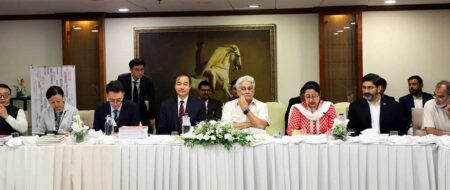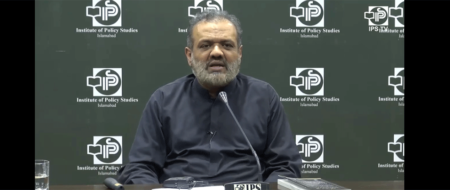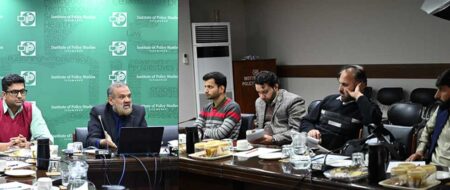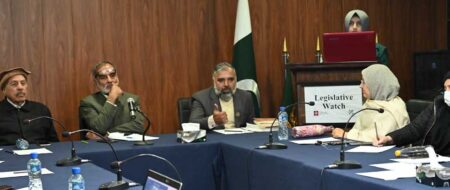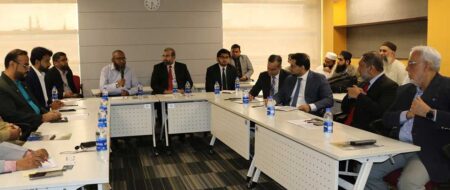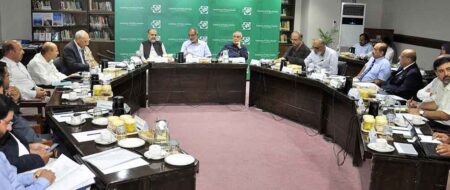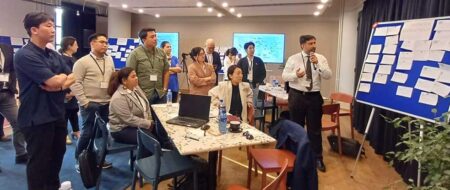Pakistan’s future growth hinges on a clear national direction: IPS-National Advisory Council
Education should be central to national development strategy; Governance reforms termed vital
Pakistan’s future growth is dependent on establishing a clear national direction that integrates positive nation-building efforts into every policy decision. This direction is crucial for resolving the country’s governance crisis, fostering ideological unity, and leveraging the nation’s untapped potential in emerging sectors like tourism and technology. Additionally, Pakistan needs to adopt a unified, whole-of-nation approach in policy decisions and reforms to overcome the complex challenges accumulated over the past seven decades.
The country’s development trajectory is directly linked to the potential of its youth and the innovation within its education system. To fully harness this transformative power, education must be positioned at the heart of the national development strategy. This approach, focused on reforms and empowerment, will allow Pakistan to cultivate future leaders, tackle emerging challenges, and assert itself as a global player. By embedding education into both national and international strategies, Pakistan can pave the way for a more sustainable and progressive future.
This was observed by a gathering of prominent academicians, educationists, senior former diplomats, and a group of leading practitioners and experts participating the annual meeting of the National Advisory Council (NAC) of IPS, held on September 14, 2024. The yearly gathering aims to garner intellectual input from veteran practitioners for IPS’ research activities and realistic ideas regarding national issues.
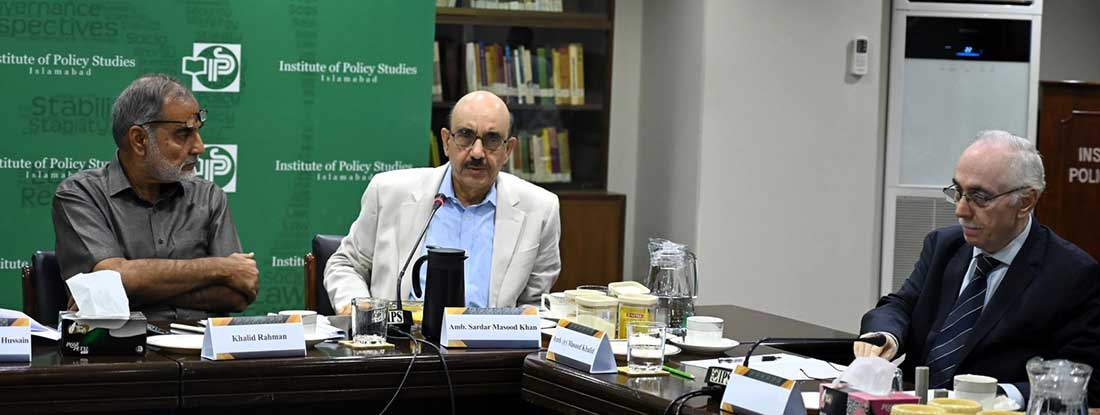
Chaired by Khalid Rahman, chairman IPS and moderated by Ambassador (r) Syed Abrar Hussain, vice chairman IPS, the meeting was addressed by Ambassador (r) Sardar Masood Khan, former president of AJK, Ambassador (r) Masood Khalid, Prof Dr Mukhtar Ahmed, chairman, Higher Education Commission (HEC), Prof Dr Anis Ahmad, vice chancellor, Riphah International University (RIU), Mirza Hamid Hasan, former federal secretary, Water and Power, Dr Syed Tahir Hijazi, former member (governance), Planning Commission of Pakistan, Syed Abu Ahmad Akif, former federal secretary, Dr Asad Zaman, former vice chancellor, Pakistan Institute of Development Economics (PIDE), Prof Jalil Aali, poet and educationist, Prof Dr Anwar ul Hassan Gilani, consultant with HEC and former vice chancellor, University of Haripur, Mufti Abdul Rahim, head of Jamia-tur-Rasheed, Karachi, and chancellor Al Ghazali University, Prof Dr Abdul Razzaq Sabir, vice chancellor, Gwadar University, Dr Syed Muhammad Junaid Zaidi, founder rector of COMSATS University, Islamabad, Dr Masood Mehmood Khan, senior lecturer, Curtin University, Australia, Dr Noreen Saher, associate professor/chairperson, Department of Anthropology, International Islamic University Islamabad (IIUI), Dr Syed Kaleem Imam, former federal secretary and IG Police, Vice Admiral (r) Iftikhar Ahmed Rao, Muhammad Bashir Jan Mohammad, chairman and director Westbury Group of Companies, Naufil Shahrukh, deputy team lead, Institutional Reform Studies, World Bank’s Karachi Water and Sewerage Services Improvement Project, and Dr Naveed Butt, former head, Pediatrics Department, Federal Government Services Hospital.
The speakers highlighted Pakistan’s policy-making crisis, stressing that “policies made in silos” lead to weak coordination and ineffective implementation. They highlighted the absence of strategic clarity and the internal tension between reformists seeking change and those clinging to the status quo as major barriers to progress. According to them, this tug-of-war reflects a deeper crisis within Pakistan’s policy-making framework.
One such example is Pakistan’s approach to the China-Pakistan Economic Corridor (CPEC). While CPEC presents a unique window of opportunity, the lack of coherent, strategic policies jeopardizes its potential. if not managed attentively and diligently, CPEC could become a missed opportunity, reflecting broader policy dysfunction. To capitalize on such opportunities, Pakistan must create an enabling environment that fosters ease of business, particularly for Chinese investments.
Focusing on the ideological foundations of Pakistan, it was stressed that nation-building must be prioritized to strengthen national unity and identity. “As an ideological state, Pakistan must assert its core principles with confidence”, it was stated. They also warned of the growing ideological disunity among both the leadership and the general populace.
While drawing lessons from the global shift toward economic priorities, particularly in Muslim countries, it was argued that Pakistan must find a balance, learning from these trends while staying true to its ideological roots. The need was emphasized for developing indigenous infrastructure in literature, media, and law enforcement to better communicate and uphold national values.
The speakers also highlighted the dangers posed by negativity and information warfare, which could contribute to strategic paralysis in the country. To counter these challenges, they called for a positive, forward-looking national direction that reasserts Pakistan’s core ideological values and emphasizes constructive nation-building.

The discussion also emphasized that the nation’s progress is closely tied to an education system that is responsive to the challenges and opportunities of the modern age. The academics underscored that universities and other educational institutions must undergo structural reforms to better equip youth with practical, forward-looking knowledge. This reform is crucial for positioning Pakistan to meet future challenges and thrive in an evolving global landscape.
The speakers expressed optimism about the current generation’s increased awareness and commitment, asserting that with the right educational environment, the youth can become powerful agents of transformation. However, there is a need to critically assess why previous constructive efforts have had limited impact.
To enable young people to act as catalysts for national development, the education system must provide them with platforms to develop their voices and contribute meaningfully to national discourse. This also involves the creation of democratic structures within political parties and the revival of platforms like student unions in a way that they serve as incubators for youth leadership and engagement.
In this way, education can also play a key role in building strategic resilience against disinformation and fifth-generation warfare. The speakers highlighted the importance of a unified national strategy to counter these threats through educating youth about national strengths and adversaries’ tactics.
Looking ahead to the opportunities of the digital age, they stressed the importance of technological advancement for Pakistan’s economic and diplomatic future. It was noted that Pakistan has the third-largest cohort of freelancers globally, representing a significant opportunity for growth. The speakers advocated for better policies and investments in technologies such as the Internet of Things (IoT), e-commerce, and generative AI, which could drive both economic and diplomatic success.
Talking about the Islamization process of education, the discussion underscored the significance of aligning educational content and pedagogy with Islamic principles, ensuring that knowledge is not only acquired but also applied within an ethical and moral framework rooted in faith. This is crucial to fostering the holistic development of individuals who are intellectually competent, spiritually grounded, and socially responsible.
Furthermore, the speakers highlighted the necessity of conducting a comprehensive audit of Pakistan’s education system, from primary to higher levels, to ensure its alignment with the nation’s socio-economic realities. They stressed that the curriculum must be updated to reflect Pakistan’s developmental needs, equipping students with the practical skills required for global competitiveness.

Beyond these internal reforms, the speakers advocated for a broader vision of education as a tool for diplomacy. They called for civil society organizations and educational institutions to engage with counterparts in neighboring countries and beyond. This can be done by utilizing education to foster dialogue, address regional issues, and promote social development. Education diplomacy, they asserted, can be a vital instrument in shaping Pakistan’s relations with the wider world and ensuring that the voices of its youth are heard on international platforms.
The speakers were confident that despite facing sten challenges, Pakistan can overcome its current difficulties and achieve stability and prosperity through a unified national charter focused on economic stability, constitutional adherence, and robust law enforcement.
Achieving this vision requires comprehensive, long-term governance reforms across all sectors to build a more capable and accountable government. A strong commitment to transparency and a unified effort to project a positive image, both domestically and internationally, are essential to this transformation.
The speakers underscored that persistent issues such as corruption, administrative inefficiency, and political polarization, continue to hamper progress. A comprehensive, long-term transformation process that incorporates governance reforms across all sectors was proposed as the way forward. Additionally, the need for truth and reconciliation efforts was highlighted as a means to overcome internal divisions and foster national unity.
One of the key points discussed was the detrimental impact of negative narratives surrounding Pakistan, both domestically and internationally. The experts stressed that countering disinformation is critical to promoting a more accurate and positive image of Pakistan’s potential and achievements. This, they noted, would not only boost the country’s international standing but also strengthen national morale.
The role of civil society in driving governance reform was deemed crucial. Advocacy and lobbying efforts, particularly those focused on ensuring the effective formulation and implementation of state policies, were proposed as vital components of the reform agenda. By engaging with key decision-makers and the general public, especially through research dissemination in both English and Urdu, civil society can help shift the national discourse toward optimism and constructive change.
The ambassadors urged civil society, especially the research community, to engage with political stakeholders more proactively. Such outreach could help inform better policy decisions, ultimately leading to a more coordinated and effective governance system.
Another vital element of the reform agenda should be capacity building within government institutions, the speakers noted. Individuals holding key positions in ministries must have the expertise to navigate complex challenges, which is essential for ensuring effective governance and policy implementation. To this end, training programs, knowledge exchange, and institutional reforms were recommended to build a more capable and accountable government.
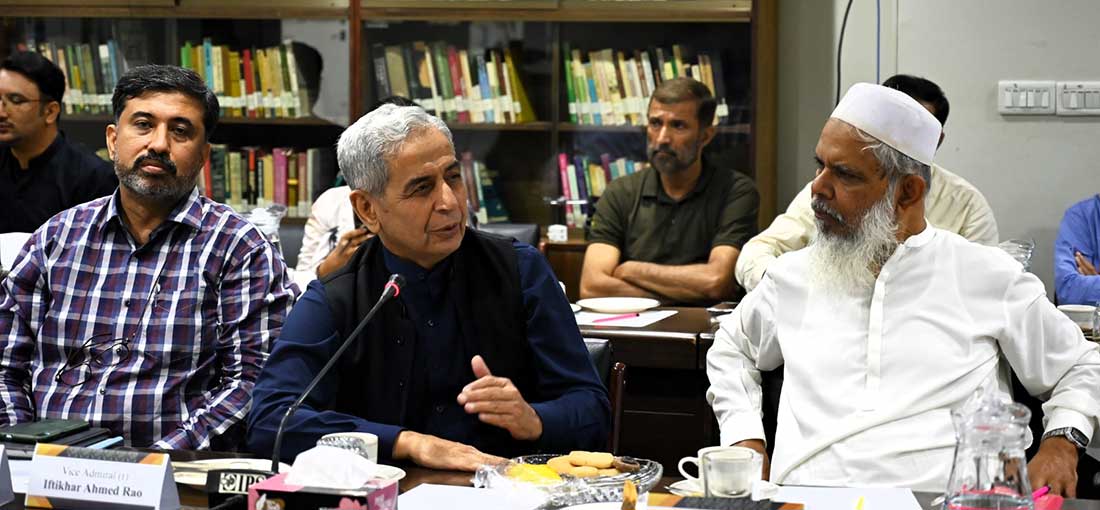
The speakers proposed a unified national charter focused on economic stability, constitutional adherence, and strong law enforcement. Pakistan’s philanthropic spirit, they noted, should be harnessed as a national asset to tackle challenges in a coordinated and unified manner. Philanthropic initiatives aligned with national development goals can address some of the immediate socio-economic concerns and contribute to long-term sustainable growth.
Regarding Pakistan’s foreign relations, the current global and regional context was seen as an opportunity to rebuild ties with neighboring countries like Afghanistan and Bangladesh. These relationships should be rooted in mutual respect, shared history, and a forward-looking agenda that benefits all parties involved. Improving regional cooperation was seen as a key to enhancing Pakistan’s strategic position and ensuring peace and development in the broader region.
The discussion concluded with a call for national unity and a strong commitment to reform. Despite the challenges, the speakers expressed optimism that with sustained efforts, Pakistan’s long-term prospects for sustainable development remain bright.




